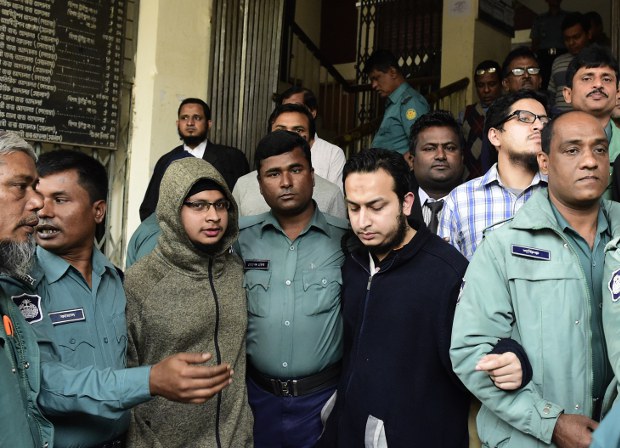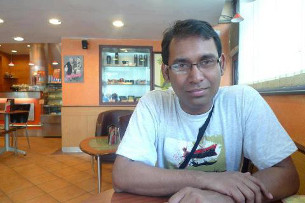Bangladesh High Court Upholds Death Sentences for 2 in Blogger’s Murder
2017.04.02
Dhaka
 Bangladeshi police escort some of the men accused in the murder of secular activist Ahmed Rajib Haider, after a court in Dhaka handed down its verdict, Dec. 31, 2015.
Bangladeshi police escort some of the men accused in the murder of secular activist Ahmed Rajib Haider, after a court in Dhaka handed down its verdict, Dec. 31, 2015.
Bangladesh’s High Court on Sunday upheld death sentences for two men convicted in the February 2013 murder of secular blogger Ahmed Rajib Haider, the first in a series of killings by Muslim zealots of writers who spoke out against religion.
The High Court division of Bangladesh’s Supreme Court also upheld a lower court’s ruling in December 2015 that sentenced six others defendants to various prison terms, including five years for Mufti Jashim Uddin Rahmani, an Islamic cleric and chief of the extremist group Ansarullah Bangla Team (ABT).
“Nobody has the right to take the law in his own hands. If anybody posts any derogatory comments about religion on Facebook, he can be put on trial,” a two-judge bench of the high court said in handing down its decision, referring to the nation’s laws that guard against defamation of religion.
Police have blamed ABT for the string of blogger-murders, and the mufti was convicted because his sermons branding bloggers as atheists and enemies of Islam were seen as inciting the young men who killed Haider near his Dhaka home on Feb. 15, 2013.
“An Imam’s duty is to conduct prayers at mosque. He will deliver the right sermon in the light of Islam. Imams should not give any sermon, which falls beyond the purview of the law.”
Since Haider was hacked to death by machete-wielding assailants four years ago, six other secular bloggers and writers were murdered in a spate of similar attacks from February 2015 through April 2016. During that span, extremists have also targeted secular publishers, along with other intellectuals, in machete-attacks.
While 14 suspects have been arrested in connection with three of the more recent murders of bloggers, apart from the eight convicted in the Haider case, none of the others have yet been tried or convicted.
“It was a pre-planned murder. The militants are educated, mature and deserve no leniency. But they did not get the maximum penalty. I cannot accept this verdict,” Haider’s father, Najim Uddin, told BenarNews after the court delivered its verdict on Sunday.
He said he had wanted to see more of the defendants – especially Mufti Jashim Uddin Rahmani – hang for his son’s murder.
Convicted
In the Haider case, Faisal bin Nayeem (alias Dwip) and Redwanul Azad Rana were both sentenced to death for being the main plotters in the killing of the 26-year-old blogger and grassroots activist.
Rana, who was tried in absentia and whom police have accused as the main suspect in the February 2015 murder in Dhaka of blogger Avijit Roy, a Bangladesh-born U.S. citizen, was taken into custody after authorities in Malaysia arrested and sent him back home in late February 2017.
The other five defendants got sentences ranging from three years to life in prison. All eight can appeal Sunday’s ruling to the Supreme Court’s Appellate Division, Deputy Attorney General Jahirul Haque, who represented the state in court, told BenarNews.
Among the remaining five, Maksudul Hasan (alias Anik) got a life term for supplying the machete used to kill the victim.
Fellow defendants Ehsan Reza Rumman, Nafis Imtiaz, and Nayem Sikdar Irad were sentenced to 10 years in prison, and Sadman Yasir Mahmud received a three-year term. All four were students at a private university.
Ahmed Rajib Haider, an architect by training and a virulent critic of Islam in predominantly Muslim Bangladesh, was a frontline organizer of Gonojagoron Moncho (Mass Awakening Platform), a grassroots movement that spearheaded unprecedented demonstrations at Dhaka’s Shahbag intersection in early 2013.
As a blogger, Haider wrote online posts under the pen-name Thaba Baba that criticized Islamic fundamentalists and warned about their growing influence in his country.
“The government claims to pursue a zero-tolerance policy against militancy. But there is no reflection of zero-tolerance in this verdict,” his father told Benar.

Ahmed Rajib Haider







